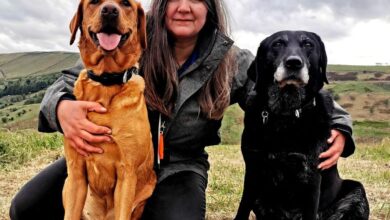Education Leavers Encouraged to Consider a Veterinary Physiotherapy Career

A new career and a skill which could benefit your Westie too?!
BY STAFF WRITER
Education leavers who haven’t quite decided what they want to do yet are being urged to consider becoming a veterinary physiotherapist.
While many veterinary roles require expensive university courses, there is an option within animal physiotherapy to train in a practical and relaxed three step route, which enables you to practice in some areas of the profession after as little as nine months.
And with many undecided people watching their former classmates go back to education this month, the timing is perfect to find out more.
Wendy Vaughan, who founded the Academy of Veterinary Physiotherapy, said: “I wanted to create learning options that were an accessible, practical and cost-effective way to get into this wonderful industry.
“There are many animal lovers out there who would make amazing veterinary physiotherapists, but perhaps they don’t thrive as well in an academic setting. This learning pathway is perfect for those people, or people looking to change their career alongside work.”
The Academy of Veterinary Physiotherapy is an iPET Network approved training provider, an award winning Ofqual regulated Awarding Organisation, and the courses are recognised and accredited by RAMP, the Register of Animal Musculoskeletal Practitioners and IRVAP, the Institute of Registered Veterinary and Animals Physiotherapists.
The Academy provides a three-step qualification pathway, which is significantly cheaper than studying at a university, via the iPET Network Level 6 Diploma in Veterinary Physiotherapy, Level 5 Diploma in Animal Sports Massage and Rehabilitation and a Level 4 Diploma in Animal Sports Massage.
The blended learning, flexible and accessible courses are delivered by Wendy and her team at The Academy of Veterinary Physiotherapy. The three- stage programme enables learners to progress at their own pace, achieving qualifications along the way, enabling people to put their skills into practice and potentially start earning in as little as around 9 months.
The degree equivalent Level 6 qualification is suitable for those currently working in the industry seeking formal recognition through a regulated qualification, as well as all of those who would like to work in this growth field, including existing dog groomers, equine grooms, hydrotherapists, and trainers.
These comprehensive qualifications are made up of practical and theoretical learning across a variety of animal species, with the practical elements focusing on the two main species of canines and equines, allowing learners to get recognition for their knowledge and practical skills in a vocational and friendly way.
Candidates will learn advanced study skills, personal development, professional development, resilience and wellbeing from people who have extensive experience of what it takes to be successful in the industry.
Wendy, who is an IRVAP, RAMP and AHPR registered therapist, said: “I am proud to have worked with iPET Network to develop this trio of qualifications, which will make these fields of veterinary science more accessible than ever, while maintaining all important best practice.
“It was important when we created the courses that they had a strong focus on animal health, behaviour and welfare, including exploring themes such as social licence to practice.
“There are also key specifics relating to the industry, legislation, regulation and working effectively as part of the multidisciplinary team, as well as a real focus on anatomy and physiology and musculoskeletal anatomy, with particular focus on function, orthopaedics and neurology, biomechanics and locomotion and exercise physiology including how commonly used equipment affects our animals.
“The course then builds on this with a strong focus on exercise prescription and rehabilitation, including physiotherapy and rehabilitation for post-surgical, neurological, juvenile, geriatric, non-ambulatory and respiratory patients and for palliative and end of life care.
“For anyone wishing to qualify it is important to learn soft tissue pathology, injury, illness, disease and musculoskeletal dysfunction, concepts of pain, pain management and advanced concepts of tissue healing which are all covered in these qualifications.
“Building on a strong foundation of sports massage and soft tissue skills the courses then teach mobilisation techniques, and the safe and effective use of electro-physical agents (EPAs) and covers advanced clinical reasoning skills and how to conduct physiotherapy assessments and design effective and measurable treatment plans.”





